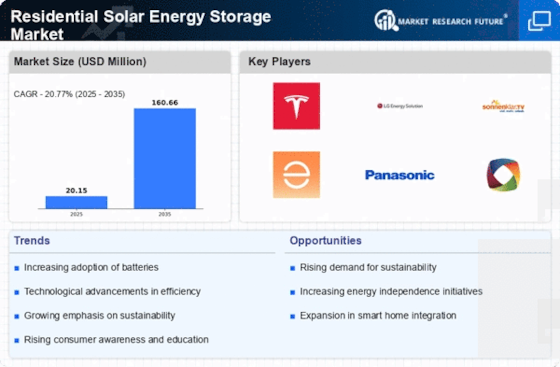Top Industry Leaders in the Residential Solar Energy Storage Market

*Disclaimer: List of key companies in no particular order
The residential solar energy storage market is rapidly evolving, driven by falling battery costs, increasing government incentives, and growing consumer awareness of the benefits of self-sufficiency and clean energy. This has attracted a diverse range of players, each with their own strategies for success.
Top Companies in the Residential Solar Energy Storage industry includes,
BYD Co. Ltd. (China)
Siemens AG (Germany)
Schneider Electric (France)
Samsung SDI Co., Ltd. (South Korea)
Eaton Corporation (Ireland)
Tesla Energy (US)
LG Chem Ltd. (South Korea)
SMA Solar Technology AG (Germany)
Eguana Technologies (Canada)
Huawei (China)
EnerSys (India)
Tabuchi Electric Co. Ltd., (Japan)
SunPower Corporation (California)
Kyocera Corporation (Japan)
Sonnen GmbH (Germany), and Others.
Key Player Strategies:
Traditional Energy Companies: Established energy providers like Shell, Exelon, and Centrica are leveraging their existing customer base and brand recognition to enter the market. They offer bundled solutions that combine solar panels and storage, making it easier for customers to transition to clean energy.
Solar Installers: Leading solar installers like Sunrun and SunPower are expanding their offerings to include storage solutions. This allows them to provide a one-stop shop for homeowners and capitalize on their existing relationships with customers.
Battery Manufacturers: Tesla, LG Chem, and Sonnen are leveraging their expertise in battery technology to develop and sell residential storage systems directly to consumers. Their focus on innovation and high-performance batteries attracts tech-savvy early adopters.
Technology Startups: Startups like sonnen, GridBeyond, and Enphase are disrupting the market with innovative software and hardware solutions. They offer smart inverters, energy management systems, and AI-powered optimization, making storage systems more intelligent and user-friendly.
Factors for Market Share Analysis:
Product Portfolio: Offering a range of storage capacities, power outputs, and system configurations caters to diverse customer needs and budgets. Companies with diverse portfolios attract a wider customer base.
Technology Innovation: Investing in next-generation battery technologies, smart energy management systems, and grid integration solutions provides a competitive edge. Companies leading in innovation attract premium customers.
Cost and Affordability: Making storage systems more affordable through competitive pricing, innovative financing options, and battery leasing models is crucial for mass adoption. Companies offering cost-effective solutions stand out.
Customer Service and Support: Providing excellent customer service, installation support, and warranty options is essential for building trust and encouraging repeat business. Companies with strong customer service reputations gain an edge.
New and Emerging Trends:
Virtual Power Plants (VPPs): Aggregating distributed storage systems into virtual power plants allows utilities to tap into this resource for grid balancing and peak demand management. Companies offering VPP integration solutions will benefit from this trend.
Non-lithium Battery Technologies: Exploring alternative battery technologies like sodium-ion or flow batteries could offer more sustainable and potentially lower-cost storage options. Companies investing in these technologies stand to gain in the future.
Integration with Smart Home Systems: Seamless integration with smart home systems and energy management platforms will enhance user experience and convenience, making storage systems more attractive to homeowners. Companies providing such integration will benefit.
Focus on Sustainability: Utilizing recycled materials, minimizing environmental impact throughout the lifecycle, and promoting responsible battery recycling are gaining traction. Companies demonstrating environmental consciousness attract eco-conscious consumers.
Overall Competitive Scenario:
The residential solar energy storage market is a dynamic and exciting space with diverse players employing varied strategies. Traditional energy companies leverage their reach, solar installers offer bundled solutions, battery manufacturers focus on innovation, and technology startups disrupt with software and hardware solutions. Factors like product portfolio, technological innovation, affordability, and customer service play a crucial role in market share analysis. New trends like VPPs, alternative battery technologies, smart home integration, and sustainability offer exciting growth opportunities. To succeed in this evolving market, players must prioritize innovation, cater to diverse customer needs, embrace sustainable practices, and explore flexible financing models. By harnessing the potential of both clean energy and cutting-edge technology, they can contribute to a more sustainable future and secure a bright future in this burgeoning sector.
Industry Developments and Latest Updates:
BYD Co. Ltd. (China):
- November 2023: BYD partners with Tesla to produce lithium iron phosphate (LFP) batteries for Tesla's Powerwall home energy storage system in China. (Source: Reuters)
- October 2023: BYD unveils its Blade Battery 3.0, claiming higher energy density and safety compared to traditional LFP batteries. (Source: BYD Global)
Siemens AG (Germany):
- December 2023: Siemens launches its SENTRON residential energy management system offering integrated photovoltaic system monitoring and storage control. (Source: Siemens Smart Infrastructure)
Schneider Electric (France):
- November 2023: Schneider Electric acquires Canadian energy storage company Iota, expanding its residential storage offerings. (Source: Schneider Electric)
Samsung SDI Co., Ltd. (South Korea):
- July 2023: Samsung SDI unveils its PRISM battery technology, aiming for longer lifespan and higher safety in home energy storage applications. (Source: Samsung SDI)
Eaton Corporation (Ireland):
- October 2023: Eaton introduces its new BrightGrid microinverter solution designed for seamless integration with residential solar and storage systems. (Source: Eaton)

